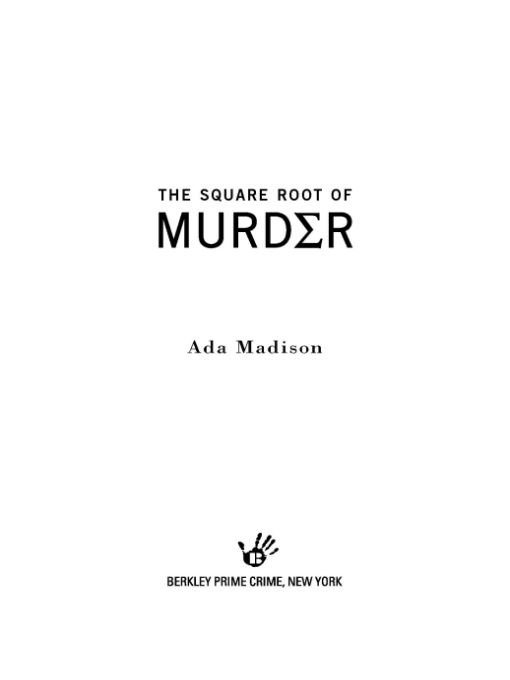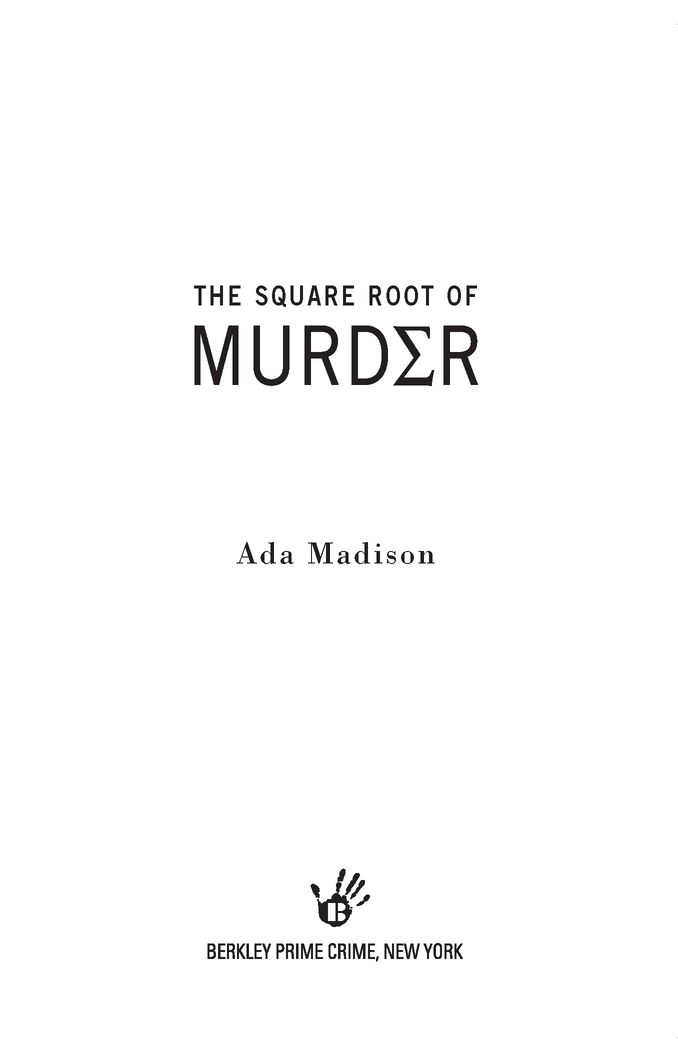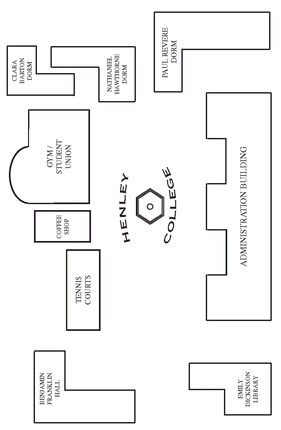The Square Root of Murder
Read The Square Root of Murder Online
Authors: Ada Madison



Table of Contents
A BAD TASTE
“What’s wrong, Rachel?”
“It’s Dr. Appleton.”
“Is he on your case again?”
“No.” I waited while Rachel took deep, audible breaths, as if she’d just come up for air after nearly drowning. “He’s dead.”
“He’s . . . ?” I switched ears as if that would send the message into a parallel mathematical plane where
Dr. Appleton is not dead
.
Dr. Appleton is not dead
.
“What happened? A heart attack?” I gulped, not wanting to hear that a strong, nasty wish from a mathematician had knocked Keith off course.
“They told me he was poisoned.” Rachel’s voice was weaker with each utterance.
“Food poisoning?” I shot a look at my fruit, crackers, and cheese and lost my appetite on the spot.
I remembered partaking generously of the big spread at the celebration in Hal’s honor. I put my hand to my throat.
“Was there something in the food at the party?” I asked Rachel, while my kitchen spun around.
“He was . . . they’re saying Dr. Appleton was murdered, Dr. Knowles.”
THE BERKLEY PUBLISHING GROUP
Published by the Penguin Group
Penguin Group (USA) Inc.
375 Hudson Street, New York, New York 10014, USA
Penguin Group (Canada), 90 Eglinton Avenue East, Suite 700, Toronto, Ontario M4P 2Y3, Canada (a division of Pearson Penguin Canada Inc.)
Penguin Books Ltd., 80 Strand, London WC2R 0RL, England
Penguin Group Ireland, 25 St. Stephen’s Green, Dublin 2, Ireland (a division of Penguin Books Ltd.)
Penguin Group (Australia), 250 Camberwell Road, Camberwell, Victoria 3124, Australia
(a division of Pearson Australia Group Pty. Ltd.)
Penguin Books India Pvt. Ltd., 11 Community Centre, Panchsheel Park, New Delhi—110 017, India
Penguin Group (NZ), 67 Apollo Drive, Rosedale, Auckland 0632, New Zealand
(a division of Pearson New Zealand Ltd.)
Penguin Books (South Africa) (Pty.) Ltd., 24 Sturdee Avenue, Rosebank, Johannesburg 2196, South Africa
Penguin Books Ltd., Registered Offices: 80 Strand, London WC2R 0RL, England
This is a work of fiction. Names, characters, places, and incidents either are the product of the author’s imagination or are used fictitiously, and any resemblance to actual persons, living or dead, business establishments, events, or locales is entirely coincidental. The publisher does not have any control over and does not assume any responsibility for author or third-party websites or their content.
THE SQUARE ROOT OF MURDER
A Berkley Prime Crime Book / published by arrangement with the author
PRINTING HISTORY
Berkley Prime Crime mass-market edition / July 2011
Brainteasers by Camille Minichino.
Interior map by Dick Rufer.
All rights reserved.
No part of this book may be reproduced, scanned, or distributed in any printed or electronic form without permission. Please do not participate in or encourage piracy of copyrighted materials in violation of the author’s rights. Purchase only authorized editions.
For information, address: The Berkley Publishing Group, a division of Penguin Group (USA) Inc., 375 Hudson Street, New York, New York 10014.
ISBN : 978-1-101-53812-8
BERKLEY
®
PRIME CRIME
®
PRIME CRIME
Berkley Prime Crime Books are published by The Berkley Publishing Group,
a division of Penguin Group (USA) Inc.,
375 Hudson Street, New York, New York 10014.
BERKLEY
®
PRIME CRIME and the PRIME CRIME logo are trademarks of Penguin Group (USA) Inc.
®
PRIME CRIME and the PRIME CRIME logo are trademarks of Penguin Group (USA) Inc.
This book is dedicated to my former agent,
the late Elaine Koster,
who saw me through fourteen books.
the late Elaine Koster,
who saw me through fourteen books.
ACKNOWLEDGMENTS
Thanks as always to my dream critique team: mystery authors Jonnie Jacobs, Rita Lakin, and Margaret Lucke.
I can’t say enough good things about Dr. Jeanne Trubek, mathematics chairwoman at Emmanuel College in Boston. Jeanne, an amazing teacher, allowed me to attend her class, answered many questions, read a draft manuscript, and is still talking to me. I hope the final product is worthy of her input.
Thanks also to Dr. Sally Dias, woman of many titles at Emmanuel, including vice president, who welcomed me back to my alma mater and has been a constant resource as well as a friend.
A special word about my good friend and medevac pilot Mark Ramos. Mark submitted to interviews straight from twelve-hour shifts. He fielded my questions, no matter how “obvious” the answers should have been, and toured me through his Northern California facility. Mark introduced me to a whole crew of generous coworkers who shared fascinating stories. In particular, I’d like to thank Ernie Acebo and Sim Mason. Flight nurse Acebo was especially helpful with details of the story. No one at the facility is responsible for my errors or literary license.
Thanks also to the extraordinary Inspector Chris Lux for continued advice on police procedure. My interpretation of his counsel should not be held against him.
Thanks to the many writers and friends who offered critique, information, brainstorming, and inspiration; in particular: Gail and David Abbate, Judy Barnett, Sara Bly, Margaret Hamilton, Eileen Hotte, Peg McPartland, Suzanne Monaco, Ann Parker, Mary Solon, Sue Stephenson, Jean Stokowski, Karen and Mark Streich, and Ellen Twaddell.
My deepest gratitude goes to my husband, Dick Rufer, the best there is. I can’t imagine working without his support. He’s my dedicated webmaster (
www.minichino.com
), layout specialist, and on-call IT department.
www.minichino.com
), layout specialist, and on-call IT department.
Finally, how lucky can I be? I’m working with a special and dedicated editor, Michelle Vega.

HENLEY BOULEVARD
Sometimes it is useful to know how large your zero is.
—AUTHOR UNKNOWN
CHAPTER 1
Who thought summer school was a good idea? Especially in Massachusetts, where the humidity can take your breath away, never mind frizz up your hair.
I loved teaching in one of the oldest buildings on the beautiful campus of Henley College. Today, however, with the temperature hovering around ninety-five degrees, I’d have been willing to give up the magnificent collegiate architecture of Benjamin Franklin Hall for a sleek, modern, air-conditioned building.
But I had only myself to blame for the fact that I was teaching on a wretched Thursday morning in July. I’d persuaded the dean to fund a learning center in Franklin, the building that housed Henley’s mathematics and science departments.
I was the go-to person for a program that provided tutoring sessions, online problem sets, videos, and classes in special topics for students at every level of achievement in math. The program, plus a twice-a-week seminar in applied statistics, kept me in a hot, stuffy classroom for many more hours than I liked.
By noon today I’d spent three hours using math games to help incoming freshmen who had declared themselves victims of math anxiety. I waved a sheaf of practice sets in front of my face, creating a warm breeze, and declared the session on graphing calculators over.
Students filed by, picking up a tip sheet for overcoming their fear of math as they left the room, hopefully for cooler realms.
“I just can’t do retro,” I overheard one young women say to another.
“I totally get it,” said her companion.
“Is there an algorithm you don’t get?” I asked, unable to resist.
“No, we’re talking about clothes, Dr. Knowles,” the first woman said.
“I knew that.”
Rachel Wheeler, my assistant, stayed behind to walk me out. Rachel was everyone’s assistant, in fact; a post-graduate student helping out in all the math and science labs.
“Do you have a minute, Dr. Knowles?” Rachel asked. Her narrow face was somber, her usual animated personality subdued. I hoped it was simply the nasty July heat that gave her a bedraggled look.
“As long as we walk while we talk,” I said, eager to leave the stifling, musty building. “We might be able to catch a breeze.”
No such luck. We walked in stagnant air down the imposing exterior steps that led from Franklin’s clock tower to the lush campus below, and headed for the parking lot.
I envied the small group of scantily clothed students in front of the gym, frolicking in the fountain that surrounded a statue of our esteemed founder. I hoped our humorless dean wasn’t looking out the window of her administration building office. The simple caper could generate a long memo from her about decorum taking precedence over the possibility of heat stroke.
“Thanks for setting up the measurements lab for tomorrow,” I said to Rachel. “I don’t know what I’d do without you.”
“I’m thinking of quitting.” Rachel’s head was down; her eyes seemed focused on her red patent sandals.
I’d heard this threat all summer, and it wasn’t about the math labs or converting from inches to centimeters. Rachel’s thesis work in chemistry had not been going well.
“Did the metric system finally get to you?” I asked, a weak joke, an attempt at lightening the mood for someone who’d been tutoring metric since her freshman year. I was sorry Rachel was having such a hard time with her key project.
We shuffled past the tennis courts, where the asphalt seemed to be sending up plumes of steam. A few yards later, Rachel stopped in front of the campus coffee shop. Ordinarily the smell of Huey’s dark roast would draw us in, but I could tell Rachel needed more than an iced cuppa.
“I mean it this time,” she said.
“He’s been that bad?”
Anyone in the Henley academic family who was listening would have known we were referring to Dr. Keith Appleton. He was Rachel’s thesis adviser and the chemistry teacher known not fondly as
Apep
, after the Egyptian god of darkness and chaos, the destroyer of dreams.
Apep
, after the Egyptian god of darkness and chaos, the destroyer of dreams.
Other books
The Turkey Wore Satin by J.J. Brass
A STELLAR AFFAIR (A Hollywood Bad Boy Romance) by Eve Montelibano
Dante's Angel by Laurie Roma
Winter Birds by Turner, Jamie Langston
Heart of the Hill by Andrea Spalding
Alibi by Teri Woods
Betina Krahn by The Mermaid
The Baby Truce by Jeannie Watt
Humans by Robert J. Sawyer
